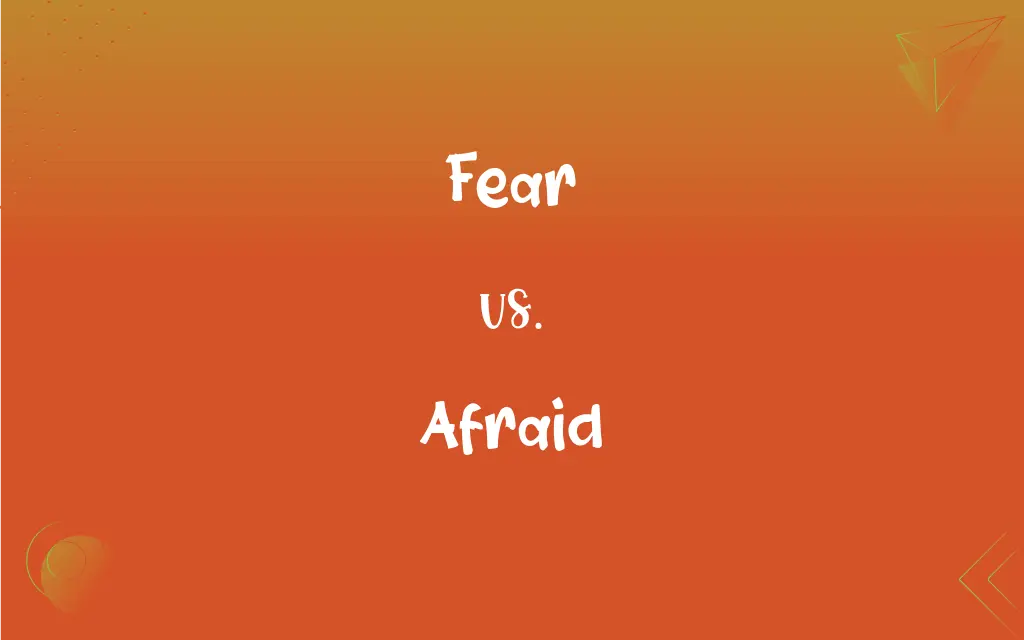Fear vs. Afraid: What's the Difference?
Edited by Aimie Carlson || By Janet White || Published on January 18, 2024
Fear is a noun representing the emotion of being scared, while afraid is an adjective describing the feeling of fear or anxiety.

Key Differences
Fear is a noun that denotes an emotion or feeling experienced in anticipation of some specific pain or danger. Afraid, an adjective, describes the state of feeling fear, often used when someone is fearful about a specific situation or outcome.
Fear can also represent a general concept or idea of dread or apprehension towards something. In contrast, afraid is used to specify someone's personal emotional response, indicating that they are experiencing fear.
In literature and speech, fear is often used to describe a broader, sometimes more abstract, sense of unease or concern. Afraid, however, is more commonly used in direct reference to an individual's feelings, as in "I am afraid of spiders."
Fear can be used as both a noun ("the fear of failure") and a verb ("to fear the unknown"), encompassing a wide range of contexts. Afraid is limited to being an adjective, qualifying a noun with the emotion of fear.
Fear is sometimes personified or used as a metaphorical concept ("Fear gripped the city"), while afraid is more straightforwardly used to describe a person's emotional state ("She was afraid to speak out").
ADVERTISEMENT
Comparison Chart
Part of Speech
Noun and verb
Adjective
Usage
Describes the emotion or concept of fear
Describes the state of feeling fear
Example in a Sentence
"The fear of heights is common."
"She is afraid of heights."
Application
Can be personified or metaphorical
Directly refers to an individual's feelings
Context
Broader, abstract sense of dread
Specific, personal emotional response
ADVERTISEMENT
Fear and Afraid Definitions
Fear
Fear is the anticipation of the possibility that something unpleasant will occur.
The fear of failure often hinders personal growth.
Afraid
Afraid often precedes a statement of concern or caution.
I'm afraid that the results were not favorable.
Fear
Fear is used to describe a general state of alarm or dread.
The news spread fear throughout the community.
Afraid
Afraid describes feeling fear or anxiety about a potential outcome.
She was afraid to take the test.
Fear
Fear is an unpleasant emotion caused by the belief that someone or something is dangerous.
His fear of the dark kept him awake at night.
Afraid
Afraid is used to express regret or apologies politely.
I'm afraid I can't agree with you.
Fear
Fear can be a specific phobia or anxiety about a particular thing or situation.
Her fear of spiders made her scream.
Afraid
Afraid can indicate reluctance or unwillingness due to fear.
He was afraid to express his opinion.
Fear
Fear can be a profound reverence and awe, especially toward the divine.
The fear of God is a fundamental concept in many religions.
Afraid
Afraid can express a mild form of fear or apprehension.
They were afraid of making a mistake.
Fear
A very unpleasant or disturbing feeling caused by the presence or imminence of danger
Our fears intensified as the storm approached.
Afraid
Filled with fear; frightened
Afraid of ghosts.
Afraid to die.
Afraid for his life.
Fear
A state or condition marked by this feeling
Living in constant fear of attack.
Saved as much as he could for fear of losing his job.
FAQs
What does afraid mean?
Feeling fear or anxiety about something.
What is fear?
An emotion experienced in anticipation of danger or pain.
Can fear be positive?
Yes, it can be a protective emotion that alerts to danger.
Can someone be afraid in a positive context?
Rarely, it's mostly used in contexts of anxiety or concern.
Is being afraid always negative?
Mostly, but it can also lead to cautious and wise decisions.
What causes fear?
Threats, dangers, unknown situations, or anxiety triggers.
What is a common fear?
Common fears include heights, spiders, or public speaking.
Is afraid used only to describe emotions?
Primarily, yes, it describes a person's emotional state.
How do people show they are afraid?
Through expressions, body language, and often verbally.
Are fears learned or innate?
Some fears are innate, while others are learned or developed.
Is fear always visible?
Not always; some people hide their fears well.
Do children and adults experience fear differently?
Yes, their fears and reactions to fear can vary significantly.
Is it okay to never feel afraid?
Rarely; fear is a natural and often necessary emotion.
Can fear be a noun and a verb?
Yes, e.g., "He has a fear of heights" (noun), "He fears heights" (verb).
Does being afraid affect decision-making?
Yes, it can lead to more cautious or risk-averse choices.
Can animals feel fear and show being afraid?
Yes, many animals exhibit fear responses.
How does culture influence fear and being afraid?
Cultural factors can determine what is feared and how fear is expressed or managed.
How can one overcome being afraid?
Through exposure, therapy, understanding, and support.
Can being afraid be rational?
Yes, when it's a response to a real and present danger.
What's the relationship between fear and anxiety?
Fear is often a response to a known threat, while anxiety is a response to an unknown or generalized threat.
About Author
Written by
Janet WhiteJanet White has been an esteemed writer and blogger for Difference Wiki. Holding a Master's degree in Science and Medical Journalism from the prestigious Boston University, she has consistently demonstrated her expertise and passion for her field. When she's not immersed in her work, Janet relishes her time exercising, delving into a good book, and cherishing moments with friends and family.
Edited by
Aimie CarlsonAimie Carlson, holding a master's degree in English literature, is a fervent English language enthusiast. She lends her writing talents to Difference Wiki, a prominent website that specializes in comparisons, offering readers insightful analyses that both captivate and inform.






































































